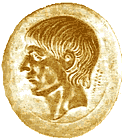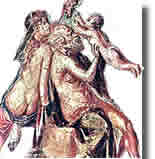| |||||||||||||||||||||||||||||||||
| Facts > Pagan Ideas > Virgin Birth | ||||
| Child of the Holy Spirit |
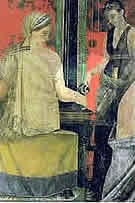
For some have thought fit ... to relate as a possible thing that Plato was the son of Amphictione, Ariston being prevented from having marital intercourse with his wife until she had given birth to him with whom she was pregnant by Apollo. And
yet these are veritable fables, which have led to the invention
of such stories concerning a man whom they regarded as possessing greater
wisdom and power than the multitude,
and as having received the beginning
of his corporeal substance from better and diviner elements
than others, because they thought that this was appropriate to persons
who were too great to be human beings. |
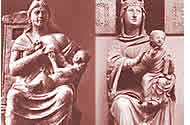 |
Now
the birth of Jesus Christ took place in this way. When
his mother Mary
had been betrothed to Joseph, before they came together
she was found to be with
child of the Holy Spirit… |
|
"How will
this be," Mary asked the angel, "since I am
a virgin?" The angel answered, "The Holy
Spirit will come upon you, and the power of the Most
High will overshadow you. |
Now let's look again at the gospel stories about Jesus' birth. These are the only two accounts of Jesus' birth in our New Testament. |
|
"Matthew" (whoever he was, whenever he wrote) says they agency of Mary's pregnancy is the divine Holy Spirit. This regulation English translation captures the meaning. >> The Greek original is clearer. Mary was found "en gastri echousa ek pneumatos agiou" ," εν γαστρι εχουσα εκ πνευματος ’αγιου" —literally, Mary was found "in her belly having from the holy spirit." |
18 Now the birth of Jesus Christ took place in this way. When his mother Mary had been betrothed to Joseph, before they came together she was found to be with child of the Holy Spirit… |
| Gospel of Matthew, Chapter 1 |
|
"Luke" (whoever he was, whenever he wrote) gives us a word for word account of Mary's palaver with an angel. from which we learn Mary will get pregnant when the Holy Spirit "overshadows" her.
|
34 "How will this be," Mary asked the angel, "since I am a virgin?" 35 The angel answered, "The Holy Spirit will come upon you, and the power of the Most High will overshadow you. |
| Gospel of Luke, Chapter 1 |
|
"Matthew" and "Luke" (whoever they were, whenever they wrote) were each careful to show Jesus getting his divine nature from the divine Holy Spirit of God. That is an utterly Pagan idea, right there in the sacred pages of our holy bible. Wow. |
The
godman's two parts |
|
Literalist Christians are highly attached to the virgin part of the Jesus' birth story, though I've never heard a convincing reasoned explanation why. I myself think the attachment is emotional. This is the sweetest, preciousest part of the story, the first part believers hear as children. Apologists have a Anyway, the virgin part of Jesus' birth myth is important to lots of nice people, so let's talk about it some. |
|
Anyway, the fellows who moved Isaiah's Hebrew "almah" over to the Septuagint picked the Greek word "parthenos," παρθενος, which Greek speakers used for both "virgin" and for "young woman," or "maiden" —the thing being, they didn't see much difference, what with them being patriarchal primitives and all, without the benefit of modern misogynist feminism to convince them there should be a difference between "virgin" and "young girl." So maybe, say fancy schmancy New Testament scholars, Isaiah's virgin will give birth prophesy is really just a young woman will give birth prophecy whose translation "Matthew" and "Luke misunderstood. Boy doesn't that put you to sleep. From POCM's point of view, it doesn't matter. What matters is "Matthew"
and "Luke" apparently thought Isaiah |
|
Reasons preview |
|
No, Christianity didn't get it's virgin birth myth by having "Matthew"
and "Luke" copy some other God's story fact by fact. That's
not how ancient religions got their myths. We've seen how they did it.
They absorbed the religious ideas of the time, and made up their own
myth "facts" to fit those ideas in with the rest of their
myth. Whoever made up the story of Alexander the Great getting
his godness from a divine snake didn't copy the "fact" of
an impregnating snake having a go at the king's wife. They used the
general notion of passing along godness, and a local reverence for divine
snakes, and made up facts to fit those ideas in with the other circumstances
of Alexander's Ditto whoever made up the virgin birth of Romulus. And the virgin birth of Perseus. And the virgin birth of Danae. And the virgin birth of Melanippe. And the virgin birth of Auge. And the virgin birth of Antiope. And the virgin birth of Plato. |
|
|
Now this Apis, or
Epaphus, is the calf of a cow which is never afterwards able to bear
young. The Egyptians say that fire
comes down from heaven upon the cow, which thereupon conceives Apis.
The calf which is so called has the following marks:- He is black,
with a square spot of white upon his forehead, and on his back the figure
of an eagle; the hairs in his tail are double, and there is a beetle
upon his tongue. |
As you'll see in the blue boxes, the ancients had lots of stories about Gods and divine men being on earth. And most of those stories included an explanation about how the divinity got to earth. if you look at "Matthew" and "Luke's" birth stories again, you'll see they're |
|
|
The ancient evidence |
In the ancient world, great men were often understood to be born of mortal women and divine fathers. Sheesh. I mean, really. Have you ever noticed how stupid other people's myths are? Until you notice this is our myth too. |
Rome's founder, Romulus, was the Son of the God Mars, and Rea Sivia, a mortal Vestal virgin
|
Adding crime to crime, he murdered his brother's sons and made the daughter, Rea Silvia, a Vestal virgin; thus, under the presence of honoring her, depriving her of all hopes of issue. [1.4] But the Fates had, I believe, already decreed
the origin of this great city and the foundation of the mightiest empire
under heaven. The Vestal was forcibly violated and gave birth to twins.
She named Mars as their father,
either because she really believed it, or because the fault might appear
less heinous if a deity were the cause of it. |
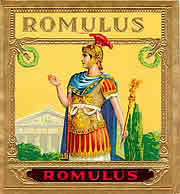 |
|
Romulus was 'hailed a
god, son of god', |
Then, when a few men gave the
lead, they all decided that Romulus
should be hailed a
god, son of a god, king, and father of the Roman state. And
in prayers they begged his grace, beseeching him to be favorable and
propitious towards them and ever to protect his descendants.
|
In the ancient world, great men were often understood to be born of mortal women and divine fathers. Sheesh. I mean, really. Have you ever noticed how stupid other people's myths are? Un till you notice this is our myth too. |
The first Roman emperor Augustus (62 BC - 14 AD), was the son of the God Apollo, conceived by a holy-snake.
|
When Atia had come
in the middle of the night to the solemn service of Apollo, she had
her litter set down in the temple and fell asleep, while the rest of
the matrons also slept. On a sudden a serpent
glided up to her and shortly went away. When she awoke, she purified
herself, as if after the embraces of her husband, and at once
there appeared on her body a mark in colors like a serpent, and she
could never get rid of it; so that presently she ceased ever to go to
the public baths. In the tenth month
after that Augustus was born
and was therefore regarded as the son
of Apollo. |
In the ancient world, great men were often understood to be born of mortal women and divine fathers. Sheesh. I mean, really. Have you ever noticed how stupid other people's myths are? Un till you notice this is our myth too. |
Publius Cornelius Scipio 'Africanus', The Elder (236 - 184 BC)
"From the sun rising above the marshes of Maeotia Epitaph of Scipio Africanus - Q. Ennius |
It is recorded
that the mother of Scipio Africanus,
the elder, had the same experience
as Olympias, Philip the Great's
wife and Alexander the Great's mother,...
his mother had long been believed sterile and that
Publius Scipio, her husband, had despaired of having children. Then,
while her husband was away and she was sleeping on her own, a huge snake
was seen beside her, in her room and in
her bed; when those who saw this snake shouted out in terror,
it vanished and could not be found. Scipio consulted the harupices about
this and they held a sacrifice and gave a response that children would
be born. Not long after the sighting of the snake, the woman began to
show all signs of being pregnant; in
the tenth month, she gave birth to this Publius Africanus, the
man who defeated Hannibal and the Carthaginians in the Second Punic
War. But it is much more because of his achievements than because of
that prodigy that he also <i.e., as well as Alexander> is thought
to be a man of godlike quality.
|
In the ancient world, great men were often understood to be born of mortal women and divine fathers. Sheesh. I mean, really. Have you ever noticed how stupid other people's myths are? Un till you notice this is our myth too. |
The godman Dionysus was the Son of Zeus and the mortal Semele.
|
I
am Dionysus, the son of Zeus, And Semele,
daughter of Cadmus' was joined with him [Zeus] in love and bore him
a splendid son, joyous Dionysus,--a
mortal woman an immortal son. And now they both are gods. |
|||||
|
||||||
A similarity the early Christians recognized, and explained away as "demonic imitation"—copied by the earlier Pagans from the later Christians, magically, backwards in time. |
The devils,
accordingly, when they heard these prophetic words,
said that Bacchus was the son of
Jupiter...and they taught that, having been torn in pieces, He
ascended into heaven. |
| The virgin birth of the God Hephaestus.
|
Hera gave birth to Hephaestus without intercourse with the other sex |
| Appolodorus, The
Library 1.3.5, 2d century BC |
| Again, the virgin birth of the God Hephaestus. |
[929a] But Hera was very angry and quarrelled with her mate. And because of this strife she bore without union with Zeus who holds the aegis a glorious son, Hephaestus, who excelled all the sons of Heaven in crafts. |
| Hesiod, Theogony, 929, 8th century BC |
Pausanias describes the birth of the God Attis:
|
a daughter of the river Sangarius, they say, took of the fruit and laid it in her bosom, when it at once disappeared, but she was with child. A boy was born, and exposed, but was tended by a he-goat. [Pausanias, Description of Greece 7.17.9-11] |
What the early Christians thought |
The second century Church Father Origen says of the Jesus' virgin birth, He lists a number of Pagan Gods born of virgins: Danae, Melanippe, Auge and Antiope. The stories about these Gods are "ancient," says Origin, but unlike the story of Jesus' virgin birth, only fables. [Origin, Against Celsus 1, 37] |
"We [Christians] are not the only persons who have recourse to miraculous narratives of this kind." [Origin, Against Celsus 1, 37] |
The second century Christian Justin Martyr says of Jesus, |
"He was born of a virgin, accept this in common with what you believe of Perseus." [Justin Martyr, First Apology, 22] |
Why did these virgin born Gods come before Jesus? Justin knew the answer—devils. |
"The devils...craftily feigned that Minerva was the daughter of Jupiter not by sexual union." [Justin Martyr, First Apology, 64] |
POCM is about history, not ethics. Jesus' miraculous conception was not new and unique—that's important for the historical truth, or not, of gospel claims. Other people take the point farther, and ask: "Can we morally say: "Ours is history, yours is a lie"? Here's how Mrs. Crossan's little boy Johnny puts it: |
Augustus came from a miraculous conception by the divine and human conjunction of [the God] Apollo and [his mother] Atia. How does the historian respond to that story? Are there any who take it literally?... That divergence raises an ethical problem for me. Either all such divine conceptions, from Alexander to Augusts and from the Christ to the Buddha, should be accepted literally and miraculously or all of them should be accepted metaphorically and theologically. It is not morally acceptable to say...our story is truth but yours is myth; ours is history but yours is a lie. It is even less morally acceptable to say that indirectly and covertly by manufacturing defensive or protective strategies that apply only to one's own story. |
| John Crosssan, The
Birth of Christianity, 1998, pg 28 - 29. |
Good Books for this section
| Born Divine
|
What you'll find:
|
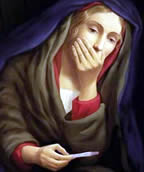
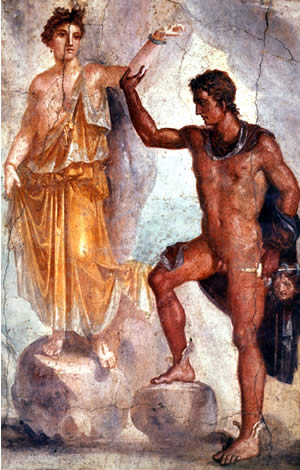 Like
the ancients, we moderns see miracles as evidences of some magic being.
In the gospel stories of Jesus' birth what we moderns notice is the
miracle of the virgin birth. A miracle. God at work.
A miracle proving Jesus is special.
Like
the ancients, we moderns see miracles as evidences of some magic being.
In the gospel stories of Jesus' birth what we moderns notice is the
miracle of the virgin birth. A miracle. God at work.
A miracle proving Jesus is special.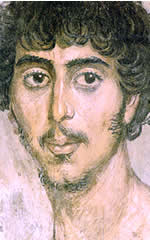 Origin
warms up by mentioning the virgin birth of Plato. >>
Origin
warms up by mentioning the virgin birth of Plato. >>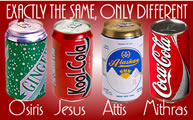
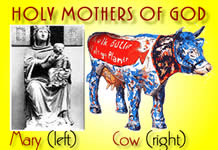 Sometimes
divinity passed to the godman, through his mortal mother, in other
ways. Apis' divinity was zapped down into his mother in
a lightening bolt, turning a normal cow into the holy and sacred mother
of the
Sometimes
divinity passed to the godman, through his mortal mother, in other
ways. Apis' divinity was zapped down into his mother in
a lightening bolt, turning a normal cow into the holy and sacred mother
of the 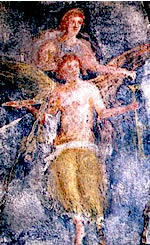 Luke's
Greek word, episkiazw,
Luke's
Greek word, episkiazw, 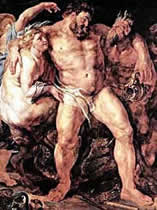
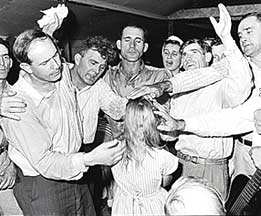 The
Virgin birth of Christ
The
Virgin birth of Christ practical
use for the virgin aspect of the virgin birth. Apologetics. If you don't
know enough about ancient religion to see the godman-being-passed-His-divinity
part of the story, or if you don't know the ancients were highly prone
to miracle stories, or if you don't care, then what you see in the gospel
stories of Jesus' birth is a unique Christian miracle. A sign of God.
practical
use for the virgin aspect of the virgin birth. Apologetics. If you don't
know enough about ancient religion to see the godman-being-passed-His-divinity
part of the story, or if you don't know the ancients were highly prone
to miracle stories, or if you don't care, then what you see in the gospel
stories of Jesus' birth is a unique Christian miracle. A sign of God.
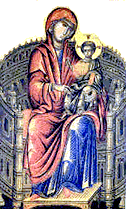 So
where does the virgin part of Jesus' birth come from?
From another part of the Christian myth. I'll be quick, since this is
standard New Testament scholarship stuff you can find in other places.
[Vaction Bible School is not one of them.]
So
where does the virgin part of Jesus' birth come from?
From another part of the Christian myth. I'll be quick, since this is
standard New Testament scholarship stuff you can find in other places.
[Vaction Bible School is not one of them.] 13
Then Isaiah said, "Hear now, you house of David! Is it not enough
to try the patience of men? Will you try the patience of my God also?
14 Therefore the Lord himself will give you a sign: The
13
Then Isaiah said, "Hear now, you house of David! Is it not enough
to try the patience of men? Will you try the patience of my God also?
14 Therefore the Lord himself will give you a sign: The Maybe.
I mean, maybe Isaiah's sentence included the word "virgin,"
but maybe it didn't. Pointy headed people argue. The
didn't crowd point out that away back in the
BCs the original Hebrew word was "almah."
Almah meant young girl. But in the
third century BC the Jewish Hebrew scripture got translated
into Jewish Greek scripture, and written down and passed
around in Greek, in a book called the Septuagint—named
after the Simon and Ellie Septuagint Foundation, which
funded the research, I think.
Maybe.
I mean, maybe Isaiah's sentence included the word "virgin,"
but maybe it didn't. Pointy headed people argue. The
didn't crowd point out that away back in the
BCs the original Hebrew word was "almah."
Almah meant young girl. But in the
third century BC the Jewish Hebrew scripture got translated
into Jewish Greek scripture, and written down and passed
around in Greek, in a book called the Septuagint—named
after the Simon and Ellie Septuagint Foundation, which
funded the research, I think. meant virgin, and they wrote it up that way. That's where Christianity's
virgin birth mythology comes from. Jesus virgin birth wasn't
an event that got reported. It started out as a doctrine, a theology:
Jesus was the messiah. More than that, Jesus was a divine godman messiah.
The sort of godman who fulfilled prophesies. Jewish scriptural prophesies.
And look here, I was flipping through the scriptures and I came across
this one about a virgin giving birth to a fellow named Immanuel. That
must mean Jesus. Jesus' mother must have been a virgin. So that's how
"Matthew" and "Luke" (whoever they were, whenever
they wrote) wrote it up.
meant virgin, and they wrote it up that way. That's where Christianity's
virgin birth mythology comes from. Jesus virgin birth wasn't
an event that got reported. It started out as a doctrine, a theology:
Jesus was the messiah. More than that, Jesus was a divine godman messiah.
The sort of godman who fulfilled prophesies. Jewish scriptural prophesies.
And look here, I was flipping through the scriptures and I came across
this one about a virgin giving birth to a fellow named Immanuel. That
must mean Jesus. Jesus' mother must have been a virgin. So that's how
"Matthew" and "Luke" (whoever they were, whenever
they wrote) wrote it up.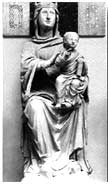
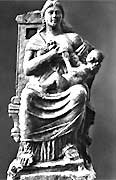 So,
did Christianity copy the virgin birth from Mithras?
Or Isis? Or anyone? There were, after all, quite a few virgin birth
stories available as sources.
So,
did Christianity copy the virgin birth from Mithras?
Or Isis? Or anyone? There were, after all, quite a few virgin birth
stories available as sources.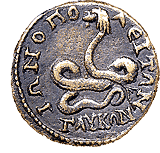 Alexander of Abnoteichus, the flim flam man who invented the
God Glycon, didn't borrow the idea of a prophecy on a buried
bronze tablet when he made up his Glycon myth. But he did borrow
the general idea of prophesy. He made up his own prophesy, and put it
on bronze tablets, because that fit the other circumstances of his Glycon
scheme.
Alexander of Abnoteichus, the flim flam man who invented the
God Glycon, didn't borrow the idea of a prophecy on a buried
bronze tablet when he made up his Glycon myth. But he did borrow
the general idea of prophesy. He made up his own prophesy, and put it
on bronze tablets, because that fit the other circumstances of his Glycon
scheme. 
 So
divinity was a sort of material thing, which if you found it on
Earth, you right away figured it had to have physically
moved from there to here—God coming down on a cloud,
say, or Zeus having sex with a mortal woman (the point
not the rowdiness of the God but the transmission of His divinity),
or a divine lightning bolt, with Apis in it, zapping
a cow and making it, when you read Herodotus [3.28],
So
divinity was a sort of material thing, which if you found it on
Earth, you right away figured it had to have physically
moved from there to here—God coming down on a cloud,
say, or Zeus having sex with a mortal woman (the point
not the rowdiness of the God but the transmission of His divinity),
or a divine lightning bolt, with Apis in it, zapping
a cow and making it, when you read Herodotus [3.28],
